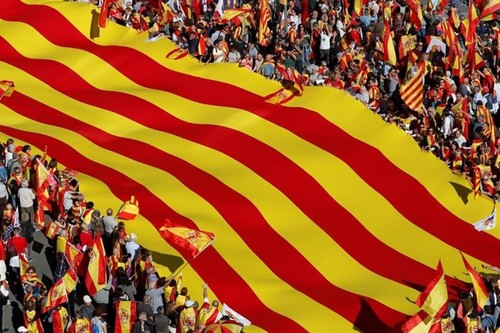 People support a united Spain in Barcelona (photo: Reuters) People support a united Spain in Barcelona (photo: Reuters)
|
The Catalan parliament voted last Friday to become an independent state, defying the central government. On Friday evening Prime Minister Rajoy called it a sad day for Spain. He said it’s important to listen to the Catalan people and let them decide their future, and no one has the right to break the law in their name.
Fallout from Catalonia’s declaration of independence
Not all the Catalan people support independence. Two days after Catalonia’s parliament declared independence for the rich region of 7.5 million people, 1 million protestors assembled in Catalonia square and along Passeig de Gracia to show their support for national unity. Spanish media reported that not since 2010, the year Spain won the World Cup for the first time, have so many Spanish flags appeared on the streets. Young and old wore the national flag and sang Viva Espana, echoing the message “Catalonia is Spain, Spain is Catalonia”. One of the most popular banners said “38% is not Catalonia”, referring to the percentage of voters who voted for Catalonia’s independence.
Thousands of people gathered at Plaza Colon in Madrid to support national unity and Spain’s Constitution.
Meanwhile thousands of independence supporters rallied at Sant Jaume square in front of administrative agencies in Barcelona to call for an uncompromising struggle against the central government. Risk analysis firm Teneo Intelligence said tensions will likely increase and demonstrators will attempt strive to obstruct police from deporting Catalonia’s ministers from their offices.
Economically, the Catalan parliament’s declaration of independence has negatively impacted the region. 1,700 firms have decided to move their head offices out of Catalonia. Fitch Ratings has placed Catalonia’s financial credit index under close watch, saying the declaration of independence will lead to an economic disaster for the local people. Juan Rosell, President of the Spanish Employers Confederation, said the situation is worsening which will cause serious economic consequences.
No country has recognized Catalonia’s independence. France, Germany, the US, and Mexico have said they will not acknowledge Catalonia’s independence. They support Prime Minister Rajoy in defending Spain’s unity. EC President Donald Tusk said Catalonia’s declaration of independence can do nothing and the EU will only work with the Spanish government.
Preparations for elections underway
A new election is seen as the best possible way to resolve Catalonia’s current situation. Spanish Foreign Minister Alfonso Dastis said he believes an election in Catalonia will end with Catalonia remaining a part of Spain.
The central government said it welcomes Catalan leader Puigdemont’s participation in the election in Catalonia in December. Spanish government spokesperson Inigo Mendez de Vigo said Puigdemont should prepare for the election if he wants to continue his political career. The PDeCAT party said Puigdemont will stand for the election.
A public survey on Sunday suggested that pro-independence parties constitute 42.5% of the vote while anti-independence parties constitute more than 43%.